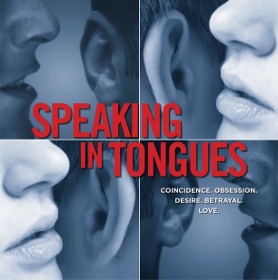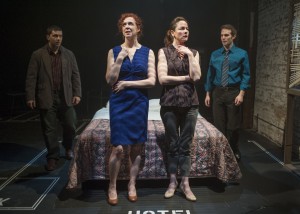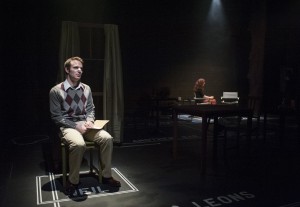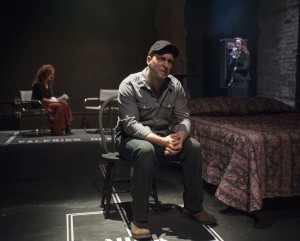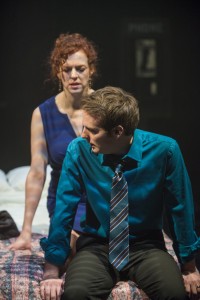STORIES IN A SPIN CYCLE
If ever the cliché “the plot thickens” justifies itself, it’s in this relentlessly inventive 1996 work by Australian playwright Andrew Bovell; anacondas after their bi-annual meal should thicken like this self-generating drama. Bovell’s well-named Speaking in Tongues employs four actors – flawlessly coordinated in Jeffry Stanton’s intricate staging for Interrobang Theatre Project – to present nine characters who spring from each other as spontaneously as they must have from their author.
Mike Mroch’s strategically schematic set outlines and labels each playing area and the characters with which it’s associated. It’s a smart move: Otherwise this intricately interwoven script could wash together like a bad watercolor. Billed as a “polyphony” and detailing the memories that fuse into regret, the two-hour two-act delivers a dazzling set of asymmetrical scenes. Utilizing the same lines in parallel storylines performed in unison by alternative sexes, the opening scene presents two couples co-existing in the same hotel room as they betray their spouses and set up a chain of sorrows to follow. Their persistent, repetitious remarks suggest interwoven fates or parallel universes.
Virtuosic players in bravura mode – Meg Elliott, Joe Flynn, Jenny Lamb, and Neal Starbird – depict lovers and strangers caught up in desire and betrayal. Their encounters, coincidental and sometimes contrived, keep pushing the plot, maddeningly or intriguingly, in unresolved directions. They assemble this proverbially “small world” in apparent flashbacks and flash-forwards: They depict a missing wife who gets lost in the woods; another wife who wrongly suspects her neighbor of killing a male fugitive who presumably drowns himself over the fiancée who fled; the ex-fiancée haunted by the kiss-off letter she wrote her man; a jogger who accidentally head butts the jilted boyfriend; a psychiatrist who needs professional help; and other characters who evolve from each other but never complete their narrative trajectories.
It’s bizarre, sometimes baffling, but consistently engrossing. A kind of voyeuristic free association connects but more often uncouples Bovell’s dream-like cheaters. It’s hard to tell if this bewildering whole really is greater than its fascinating parts, but the trip is worth the taking.
Speaking in Tongues
Interrobang Theatre Project at Theater Wit
scheduled to end on March 24, 2013
for tickets, visit www.theaterwit.org/boxoffice
for info on this and other Chicago Theater,
visit http://www.TheatreinChicago.com
